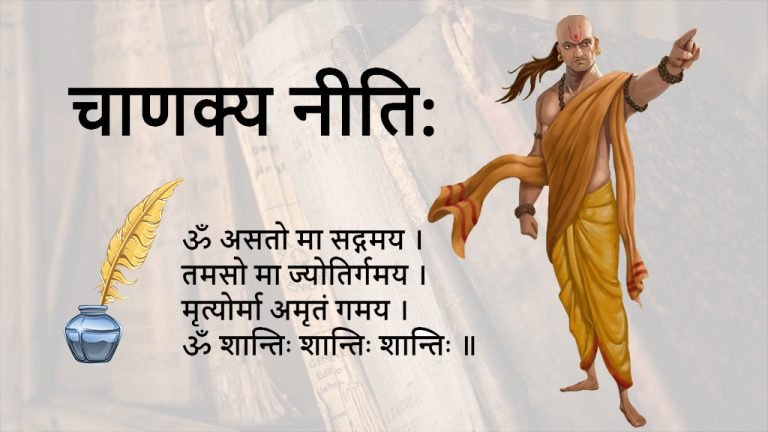Chanakya is considered the pioneer of the field of Political science and economics in India, and his work is thought of as an important precursor to classical economics. Chanakya the Great Economist was an ancient Indian polymath who was active as a teacher, author, strategist, philosopher, economist, jurist and royal advisor. He is traditionally identified as Kauṭilya or Vishnugupta, who authored the ancient Indian political treatise, the Arthashastra, a text dated to roughly between the fourth century BCE and the third century CE. The Arthashastra continued to exert considerable influence after the reign of Ashoka but then disappeared and was considered lost until it was discovered in 1905 CE by the Sanskrit scholar Rudrapatna Shamasastry (l. 1868-1944 CE). Rudrapatna Shamasastry published the work in 1909 CE and then translated it into English and published that version in 1915 CE which brought it greater attention.
Chanakya’s Arthashastra which is very famous by the name of Niti Shastra, describes 17 chapters and 342 sutras written in it. For details visit our site https://digitalksp.com/category/education/.
Chanakya NITI – 11th Chapter – in English
- Generosity, pleasing address, courage and propriety of conduct are not acquired, but are inbred qualities.
- He who forsakes his own community and joins another perishes as the king who embraces an unrighteous path.
- The elephant has a huge body but is controlled by the ankusha (goad): yet, is the goad as large as the elephant? A lighted candle banishes darkness: is the candle as vast as the darkness. A mountain is broken even by a thunderbolt: is the thunderbolt therefore as big as the mountain? No, he whose power prevails is really mighty; what is there in bulk/big size?
- Lord Vishnu leaves the earth after completing ten thousand years of Kaliyug, the Ganga withdraws her water after completing half of this period and Gramdevta leaves the village after completing half of this period. According to Chanakya nothing is stable in this world.
- One who is attached with home does not get knowledge, meat eaters are not merciful, greedy are not truthful and a man of loose character is not pure.
- The wicked man will not attain sanctity even if he is instructed in different ways, and the nim tree will not become sweet even if it is sprinkled from the top to the roots with milk and ghee.
- Mental dirt cannot be washed away even by one-hundred baths in the sacred waters, just as a wine pot cannot be purified even by evaporating all the wine by fire.
- It is not strange if a man reviles (Degrades) a thing of which he has no knowledge, just as a wild hunter’s wife throws away the pearl that is found in the head of an elephant, and picks up a gunj(a type of seed which poor tribals wear as ornaments).
- He who for one year eats his meals silently (inwardly meditating upon the Lord’s prasadam); attains to the heavenly planets for a thousand crore of years. ( Note: one crore equals ten million)
- The student (brahmacari) should completely renounce the following eight things — his lust, anger, greed, desire for sweets, sense of decorating the body, excessive curiosity, excessive sleep, and excessive endeavour for bodily maintenance.
- A Brahman who eats only roots and bulbs produced from an untitled land, who always lives in the jungle and performs Shradha is a sage in real.
- He alone is a true brahmana (dvija or “twice-born”) who is satisfied with one meal a day, who has the six samskaras (or acts of purification such as garbhadhana, etc.) performed for him, and who cohabits with his wife only once in a month on an auspicious day after her menses.
- The brahmana who is engrossed in worldly affairs, brings up cows and is engaged in trade is really called a vaishya.
- The brahmana who deals in lac-die, articles, oil, indigo, silken cloth,honey, clarified butter, liquor, and flesh is called a shudra.
- The brahmana who thwarts the doings of others, who is hypocritical, selfish, and a deceitful hater, and while speaking mildly cherishes cruelty in his heart, is called a cat.
- The brahmana who destroys a pond, a well, a tank, a garden and a temple is called a mleccha.
- The brahmana who steals the property of the Deities and the spiritual preceptor, who cohabits with another’s wife, and who maintains himself by eating anything and everything is called a chandala.
- The meritorious should give away in charity all that they have in excess of their needs. By charity only Karna, Bali and King Vikramaditya survive even today. Just see the plight of the honeybees beating their legs in despair upon the earth. They are saying to themselves, “Alas! We neither enjoyed our stored-up honey nor gave it to charity, and now someone has taken it from us in an instant.”






